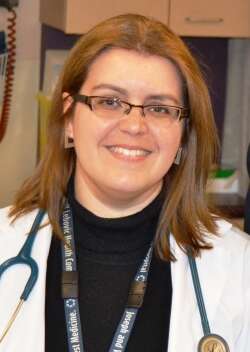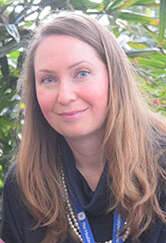Main Second Level Navigation
- Welcome
- Why Toronto?
- History of the Department
- Vision & Strategic Priorities
- Our Leadership
- Our Support Staff
- Location & Contact
- Departmental Committees
- Department of Medicine Prizes & Awards
- Department of Medicine Resident Awards
- Department of Medicine: Self-Study Report (2013 - 2018)
- Department of Medicine: Self-Study Report (2018 - 2023)
- Communication Resources
- Department of Medicine Annual Report
- News
- Events
Fellowship Reflections

We asked four appointed faculty members, all of whom came from various parts of the world to complete their fellowship training at the University of Toronto, Department of Medicine, what they valued most about their fellowship training, what they would have changed, and how their fellowship impacted their careers in academic medicine. This is what they had to say:

Reflections on the fellowship experience:
“I chose to come here because the Leadership Sinai Centre for Diabetes is a worldwide recognized clinical research centre for diabetes and I wanted to learn from the best people in the world. I had the opportunity to work under the supervision of well-known clinical researchers in my field.
I had an amazing experience. I think the only thing that could have been different/better is the interaction with other fellows. As a newcomer to Canada, during the first year, sometimes I felt somewhat isolated in my department. Thus, I feel that if U of T had more social events to help newcomers to socialize with other fellows that would have been nice.
My experience during my fellowship was life-changing. Not only did I learn a lot about clinical research, having several publications in high-impact journals, but I was lucky to find colleagues that enriched my personal life as well. My mentors (Drs. Zinman and Retnakaran) inspired me to be a better researcher, their passion for clinical research made me want to do more for people with diabetes and on a personal level, they became my friends and their integrity and kindness as human beings warmed my heart. It was because of the fellowship that I was later appointed as assistant professor at University of Toronto, Division of Endocrinology and Metabolism, which was a dream come true for me. I am fortunate to be part of one of the best universities in the world.”
Frank Michelis, assistant professor, Division of Hematology, completed his residency training at the University of Athens, Athens, Greece. He came to Canada on October 1st, 2011 to complete fellowship training in the allogeneic transplant program at the U of T and the Princess Margaret Cancer Centre.
Reflections on the fellowship experience:
“The fellowship offered me an excellent work environment with ample opportunity to advance my career, develop my skills in my specialty, and perform research with exceptional colleagues.
For me, had I known in advance the University of Toronto master’s degree requirement – needing a U of T master's to be hired on as faculty – I would have tried to initiate that earlier in my fellowship.
My fellowship, which was exclusively within the allogeneic transplant program of the Princess Margaret Cancer Centre, helped me develop the professional integrity required to make this subspecialty the focus of my career. My fellowship was integral to my career development in every aspect.”

Reflections on the fellowship experience:
“The staff on the palliative care unit at Princess Margaret Cancer Centre were all very welcoming; I felt valued and appreciated by them. I was also impressed and surprised by the general collegial interactions between different departments at Princess Margaret, Toronto General and Toronto Western hospitals.
A couple of days before my very first day at work, I had to complete a mandatory fire training exercise which was helpful. As part of this "orientation," I attended a workshop on the hospital pension scheme, which I later found I wasn't eligible for. I would have loved an orientation with a clinical focus, specific to my specialty, with additional tools and resources to help navigate the administrative structure. It was very hard to work at the same pace as everyone else, while simultaneously figuring out how everything worked. This was a huge learning curve. Even though my inter-professional colleagues were eager to teach me as I came across differences between the two countries, on issues that ranged from medication differences, to language, to prescribing, a formal orientation would have been tremendously helpful. I can't imagine how much more stressful it would have been if my first language was not English or if the culture was significantly different from that of Canada.
The unfamiliar work environment meant that I had to start from scratch and work hard on developing relationships every day. Socially it was very isolating. Not having a support network of friends and colleagues made it harder to cope with work place challenges. I learned a lot from "swapping notes" on chance encounters with fellows from other departments on lots of different issues, and so, would have valued networking opportunities, as well as access to mentors who had previously completed a similar fellowship for guidance and support.”
Auro Viswabandya, Divisions of Medical Oncology and Hematology, completed sub-speciality hematology training at Christian Medical College, Vellore, India and arrived in Canada in September 2009 to complete a three-year fellowship in malignant hematology and stem cell transplant.
Reflections on the fellowship experience:
“I chose to do my fellowship here so that I could get an exposure to different areas of malignant hematology and transplantation. It was possible to do a fellowship in all areas of malignant hematology and stem cell transplantation at one institute (Princess Margaret Hospital).
Personally and professionally, it (the fellowship) has definitely helped me in my career development. However, I think, professional experience and exposure could have been better. A structured curriculum will help fellows to maximize their learning. Fellowship training ideally should be considered need-based so that each fellow, depending on their goals and objectives, can get the most out of their training.”



